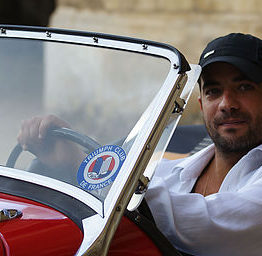
Cédric Loeffler picked up his first guitar chords at the age of 10 with an assist from his uncle, Josélito. His grandfather was a guitarist too, and all his uncles and brothers are musicians. Word is that his father, Marcel Loeffler, is no slouch on the accordion. It was the latter who has said, “Among the Manouche it is a great tradition to make music every day, and Cédric has been bathed in music from a very young age. That is worth all the conservatories in the world.”
His proud—and discerning—papa also says the following of his primary accompanist:
Cédric is a great specialist, of course, in the music of Django and in this solid rhythm guitar style now known as the “Alsatian pompe.” For us, this comes straight from home and it has become a must the world over for anyone playing jazz manouche.
Here’s a sample of the Alsatian pompe to which he is referring, courtesy of both Josélito and Cédric, from Marcel Loeffler’s 2005 release, Source Manouche:
Marcel continues:
But above all, Cedric’s specialty is that he can accompany swing waltzes with great delicacy. He also knows how to accompany czardas in the traditional style—as one might have heard fifty years ago. Cédric offers “old-school” accompaniment that combines light swing, finesse and precision. We hear the bass, the chords—an orchestra all by itself—something that is not so common today.
For example, here’s another cut from Source Manouche, Tony Morena’s swing valse classic, “Passion.”
In addition to extensive touring and recording with his father, Cédric Loeffler has been sought out as an accompanist by his cousin Yorgui Loeffler, Bireli Lagrene, Dorado and Tchavolo Schmitt, and Mandino Reinhardt.
If you have an interest in Gypsy jazz rhythm guitar, you have an interest in connecting with Cédric Loeffler come June. We can’t make you a part of the Loeffler clan. But we can do our best to make them part of ours.